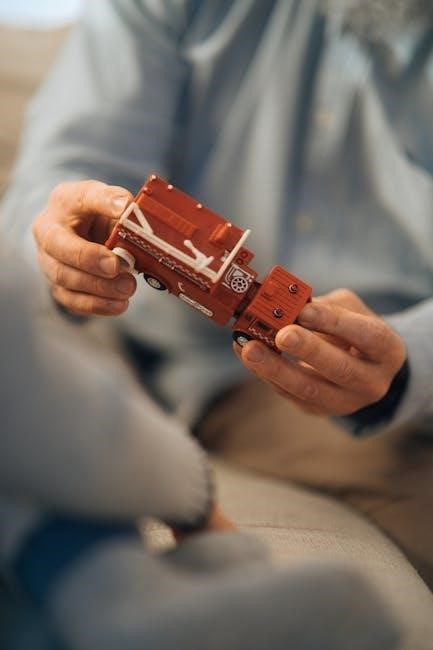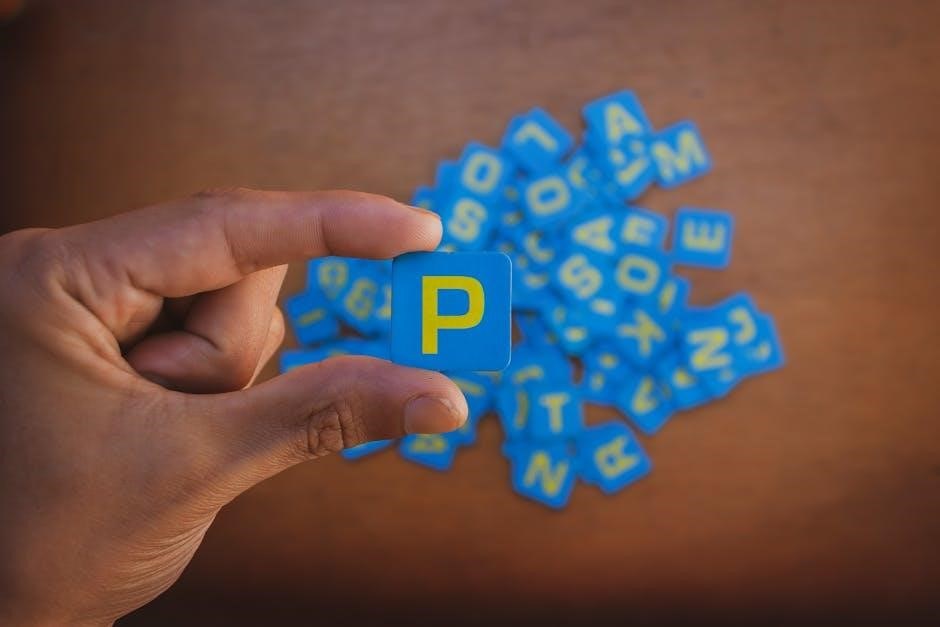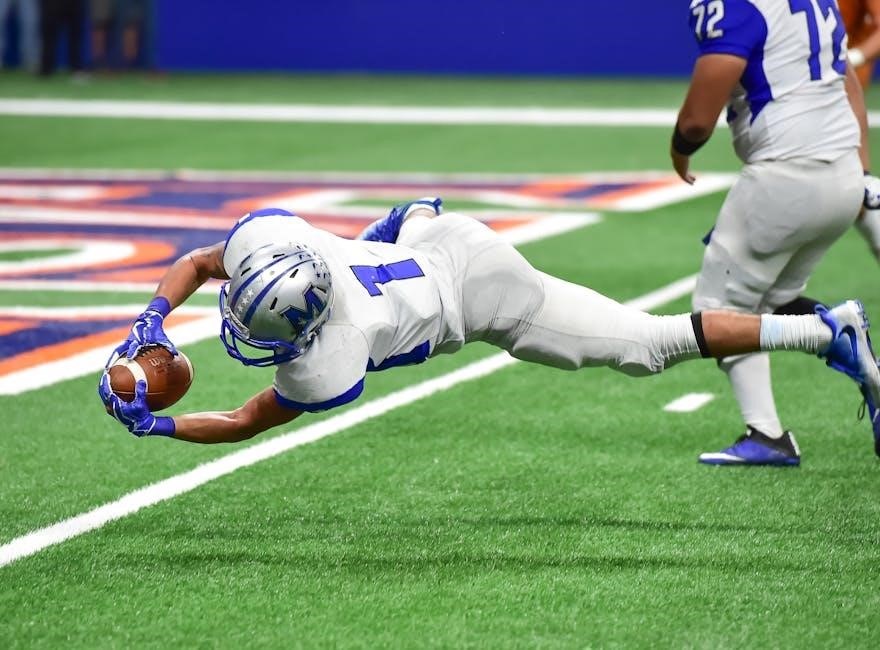Welcome to the FTC CenterStage Game Manual 1, your essential guide to understanding the 2023-2024 season. Released on July 11th, it outlines game rules, field layout, and scoring mechanics; Refer to the Game and Season Info page for updates and additional resources to prepare your team for competition. This manual is crucial for a successful FIRST Tech Challenge experience;
1.1 Overview of the Game Manual Structure
The FTC CenterStage Game Manual is divided into two main parts, each addressing specific aspects of the competition. Game Manual Part 1 covers foundational elements like game rules, field layout, and scoring mechanics, while Game Manual Part 2 focuses on robot construction, inspection processes, and event-specific guidelines. Together, they provide a comprehensive guide for teams to navigate the 2023-2024 season successfully.
1.2 Importance of Understanding the Manual
Understanding the FTC CenterStage Game Manual is crucial for team success. It outlines rules, field layouts, scoring, and robot guidelines, ensuring compliance and eligibility. The manual serves as the official reference for resolving questions and disputes. Teams that thoroughly understand the manual can avoid penalties, prepare strategically, and maximize their performance during competitions. It is essential for a smooth and successful participation in the FIRST Tech Challenge.

Game Overview and Objectives
The FTC CenterStage game focuses on alliances, strategy, and precision. Teams collaborate to complete challenges, earning points through efficient gameplay and adherence to scoring mechanics.
2.1 Description of the CenterStage Game
The CenterStage game is a dynamic, alliance-based competition where teams navigate a challenging field, completing tasks like scoring, lifting, and manipulating game elements. Robots must work collaboratively to achieve objectives, emphasizing strategy and precision. The game animation provides a visual overview, while the field design incorporates zones for scoring and interaction, requiring teams to balance offense and defense effectively during matches.
2.2 Key Objectives for Teams
Teams must focus on scoring points by navigating the field, acquiring, and depositing game elements into designated zones. Collaboration with alliance partners is crucial to maximize points. Effective use of endgame mechanisms and defensive strategies can disrupt opponents while securing advantageous positions. Balancing speed, precision, and teamwork ensures optimal performance and achievement of match objectives in the CenterStage game.

The Game Field and Elements
The FTC CenterStage game field features a dynamic layout with zones and elements designed for strategic gameplay. Understanding the field is crucial for effective game planning and execution.
3.1 Layout of the Playing Field
The FTC CenterStage playing field is a 12×12-foot square, divided into zones with specific roles. It features scoring areas, barriers, and interactive elements designed to challenge teams. The layout includes zones for launching, collecting, and scoring, with clear markings to guide gameplay. Teams must understand the field’s dimensions and elements to strategize effectively and optimize their robot’s performance during matches.
3.2 Key Game Elements and Their Roles
The FTC CenterStage game features key elements like scoring zones, ramps, and interactive components. These elements are designed to challenge teams and require strategic planning. Each element serves a specific purpose, such as enabling point accumulation or creating obstacles. Understanding these components is vital for developing effective gameplay strategies and maximizing a team’s performance during matches.
Scoring and Gameplay Mechanics
Scoring in CenterStage involves accumulating points through strategic actions and alliances. Gameplay mechanics emphasize efficiency, precision, and time management to maximize points during matches.
4.1 How to Score Points in CenterStage
Earning points in CenterStage involves strategic alliances and precise actions. Teams score by autonomously moving cones during the Autonomous period and transporting them to high-scoring zones during Tele-Op. Additionally, balancing seesaws at the end of matches rewards bonus points. Efficiency and coordination with alliance partners are key to maximizing points and securing victory in this dynamic competition.
4.2 Gameplay Rules and Defense Strategies
Teams must adhere to rules preventing excessive blocking or pushing opponents. Defense strategies focus on controlling cone access and disrupting opponents’ scoring attempts. Robots can use attachments to maneuver cones, but intentional tampering is penalized. Effective communication with alliance partners enhances defensive positioning. Unsportsmanlike conduct results in penalties, ensuring fair play. Balancing defense with offensive scoring is crucial for success.

Robot Construction and Inspection Rules
Robots must meet specific construction requirements and pass rigorous inspections to ensure eligibility. Teams must use approved materials and tools, like the FTC Blocks Development tool. Inspections verify compliance with size, weight, and safety standards, ensuring fair competition. Refer to the manual updated 10/4/23 for detailed guidelines and eligibility criteria.
5.1 Robot Construction Requirements
Robots must adhere to specific construction guidelines to ensure safety and fair competition. Teams are required to use approved materials and tools, such as the FTC Blocks Development tool. The robot must meet size and weight constraints, with a maximum weight of 42 pounds. All components, including programming and communication systems, must comply with FIRST Tech Challenge regulations. Refer to the updated manual for detailed specifications and compliance standards.
5.2 Inspection Processes and Eligibility
Robots undergo rigorous inspection to ensure compliance with FTC regulations. Teams must meet specific eligibility criteria, including the use of approved materials and components. Communication systems between the robot and Driver Station must be unmodified and follow official guidelines. Inspection processes verify rules adherence, ensuring fair competition. Detailed guidelines are outlined in the Game Manual Part 1 and Part 2, available on the Game and Season Info page.

Remote and Traditional Events
FTC offers both remote and traditional events, providing flexible participation formats. Teams can compete in-person or virtually, adhering to specific rules and logistics for each format.
6.1 Differences Between Remote and Traditional Events
Remote and traditional FTC events differ in format and logistics. Traditional events occur in-person with physical fields, while remote events are virtual, requiring teams to adhere to specific online rules. Both formats have updated guidelines, with remote events updated on 10/4/23 and traditional events following established protocols. Teams must familiarize themselves with the unique rules for each format to ensure compliance and fair competition.
6.2 Event-Specific Rules and Guidelines
Event-specific rules ensure fairness and consistency across both remote and traditional competitions. Teams must adhere to guidelines such as limited communication between the Robot Controller and Driver Station, as outlined in the manual. Safety protocols and eligibility checks are strictly enforced. Regular updates and clarifications are provided in the Game Manual, ensuring all teams are informed and prepared for competition.

Tools and Resources for Teams
Essential tools include FTC Blocks, a visual programming tool, and resources like the official FTC website for updates and support. Utilize these to enhance your team’s performance and understanding of the game mechanics effectively.
7.1 Recommended Tools for FTC Teams
Essential tools for FTC teams include FTC Blocks, a visual programming tool, and resources like the Game Manual Quiz for understanding rules. Additionally, the Robot-in-3-Days guide and FIRST Tech Challenge official resources provide valuable insights. These tools are crucial for enhancing your team’s performance, streamlining robot development, and ensuring compliance with game regulations throughout the season.
7.2 Additional Resources for Success
Beyond the essential tools, teams can benefit from the Game Manual Quiz to test their understanding of rules. Educational video series, such as the ABCs of FTC Awards, and archived game documentation provide deeper insights. The FIRST Tech Challenge official website offers seasonal updates, while resources like Wizard’s Video Series and goBILDA Robot-in-3-Days guide teams in building competitive robots and strategies for success.

Seasonal Game Information
The 2023-2024 FTC CenterStage game details, including updates and archives, are available on the Game and Season Info page. The manual was released on July 11, 2023, with additional resources like the game animation video for better understanding.
8.1 Release Dates and Updates for Game Manuals
FTC CenterStage Game Manual 1 was released on July 11, 2023, with updates available on the Game and Season Info page. Part 1 was updated on October 4, 2023, ensuring teams have the latest rules and guidelines. Regular updates are posted to keep teams informed, and archived versions are accessible for reference. Always refer to the official Game Manual for the most current information.
8.2 Accessing Archived Game Documentation
Archived FTC game manuals and documentation are available on the Archived Game Documentation webpage. This resource provides access to past seasons’ manuals, game elements, and rules for reference. Teams can review previous game setups to better understand the evolution of the competition. Additionally, a text-based English version is available for assistive devices, ensuring accessibility for all participants. Visit the official Game and Season Info page for the most current updates.
Quizzes and Training Materials
The FTC CenterStage Game Manual includes a quiz to test understanding of key rules and strategies. Additional resources like video tutorials and guides are available online to help teams prepare effectively for competition.
9.1 Game Manual Quiz for Teams
The FTC CenterStage Game Manual Quiz is designed to help teams assess their understanding of the rules and strategies. Covering key sections from both Part 1 and Part 2, the quiz includes essential questions to identify knowledge gaps. Teams can use this tool to ensure they are well-prepared for competition. Additional training materials, such as video tutorials and guides, are also available to enhance learning and performance.
9.2 Educational Resources for Better Understanding
Supplement your learning with the FTC Team Startup Guide and video tutorials. The Wizard Robotics video series offers insights into game mechanics and strategies. Additionally, the FTC Blocks Development tool provides hands-on programming practice. These resources, along with archived documentation, ensure teams have comprehensive knowledge to excel in the competition. Utilize these tools to enhance your preparation and performance effectively.
Game Animation and Visual Aids
The 2023-2024 CENTERSTAGE game animation, released on September 17, 2023, provides a detailed visual overview of the game. With 152K views, it highlights field elements and robot interactions. Additionally, the goBILDA Robot-in-3-Days FTC CENTERSTAGE Bot Breakdown video offers a visual analysis of the robot and field design, aiding teams in understanding gameplay mechanics.
10.1 Overview of the CenterStage Game Animation
The 2023-2024 CENTERSTAGE game animation, released on September 17, 2023, provides a visual breakdown of the game setup, field elements, and robot interactions. With over 152K views, it serves as a critical resource for teams to understand the game’s structure and objectives. The animation highlights key components such as scoring zones, game pieces, and robot movements, ensuring teams can visualize gameplay dynamics effectively.
10.2 Visual Breakdown of the Robot and Field
The visual breakdown in the CENTERSTAGE game animation details the field layout and robot components. It highlights scoring zones, game pieces, and robot interactions. Tools like FTC Blocks aid in programming and design. The animation also showcases robot movements and strategies, providing a clear understanding of game dynamics. Teams can use this resource to visualize and plan their robot’s performance effectively during matches.
Drive Team Roles and Responsibilities
The drive team manages robot operation during matches, ensuring safe and efficient performance. They stage the robot, handle post-match removal, and adhere to safety protocols strictly.
11.1 Expectations for Drive Teams During Matches
Drive teams must ensure safe and efficient robot operation during matches. They are responsible for staging the robot, conducting pre-match checks, and executing strategies effectively. Post-match, they must remove the robot swiftly and safely. Teams should adhere to all safety protocols and competition rules to maintain a fair and organized event environment for all participants.
11.2 Safety Protocols for Robot Handling
Handling robots requires strict adherence to safety protocols to prevent accidents. Teams must ensure robots are securely fastened and loose parts are removed before handling. Use only approved mechanisms for communication between the robot and driver station. Always follow FIRST Tech Challenge guidelines to ensure safe operations during matches and practices, minimizing risks to participants and equipment.
Competition Levels and Expectations
The FTC CenterStage competition progresses through local, regional, and international levels, with higher expectations at each stage. Teams must be prepared for increased competition intensity and rigorous judging criteria as they advance.
12.1 FIRST Championship and Higher-Level Competitions
The FIRST Championship is the pinnacle of FTC competition, featuring teams from around the world. At this level, teams face intense competition and rigorous judging criteria. Expectations for robot performance, strategy, and teamwork are exceptionally high. Teams must be well-prepared and organized to succeed. The championship offers unique challenges and opportunities for growth, making it a premier event in robotics and innovation.
12.2 Judging Sessions and Performance Criteria
Judging sessions evaluate teams based on robot performance, engineering design, and teamwork. Criteria include innovation, strategy, and adherence to game rules. Judges assess how effectively robots execute tasks and their overall design quality. Teams must demonstrate clear communication of their design process and gameplay strategy. High scores reflect exceptional performance, creativity, and adherence to FTC standards, making judging sessions critical for advancing in competitions.
Congratulations on completing the FTC CenterStage Game Manual 1! This guide is essential for a successful 2023-2024 season. Thorough preparation and teamwork will lead your team to success. Good luck!
13.1 Summary of Key Takeaways
The FTC CenterStage Game Manual 1 is your primary guide for the 2023-2024 season, covering game rules, field layout, and scoring mechanics. Regular updates ensure you stay informed. Key takeaways include understanding game objectives, mastering scoring strategies, and adhering to robot construction rules. Utilize the manual’s resources, such as quizzes and visual aids, to enhance your team’s preparation. Stay updated by referring to the official Game and Season Info page for the latest details and additional tools to ensure success in the competition.
13.2 Encouragement for Teams to Prepare
Embrace the challenge of the FTC CenterStage season with dedication and teamwork. Utilize the manual’s resources, including quizzes and visual aids, to deepen your understanding. Leverage recommended tools like FTC Blocks for efficient programming. Stay updated on the Game and Season Info page for the latest guidelines. With thorough preparation and collaboration, your team can achieve success and make the most of this exciting competition.
